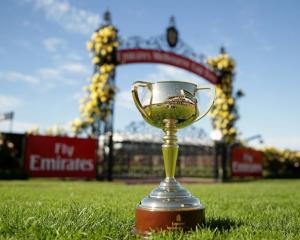North Otago thoroughbred clubs are taking a measured approach to the news their racecourses could be axed and sold off.
Stakeholders in North Otago and South Canterbury were handed a massive surprise last week when Australian John Messara's report on the industry suggested the Oamaru, Kurow, Waimate and Timaru tracks should no longer be used for thoroughbred meetings.
They are mystified why the Oamaru track has been slated for closure in 2024.
The track is widely regarded as one of the South Island's best winter thoroughbred venues.
The Waikouaiti racecourse is not held in the same regard, holds fewer meetings - only one thoroughbred meeting - and has more decaying facilities, yet is set to remain open.
That made the decision to close puzzling, Oamaru Jockey Club president John Foley said.
``Oamaru is recognised as the best winter track in the South Island.
``Racing at Waikouaiti in the middle of winter wouldn't be much fun.
``I think we have been unfairly judged simply because we race in the winter.''
Not enough common sense had been applied in regard to southern tracks, Foley said.
``I just think it really hasn't been thought through.
``They are obviously going to put more racing on those designated tracks that they have identified. But a lot of the tracks don't have a lot of summer heat growth, so they won't recover.
``Oamaru has access to irrigation and drainage. As far as improving the track [goes], not a lot has to be done.
``We can have a facility there that incorporates both codes and one that is well utilised by both codes.''
The Kurow Jockey Club is facing the prospect of its licence to hold racing being cancelled after it runs its annual meeting in December.
Messara's report suggests the club could continue to race at Wingatui or Cromwell.
Club president Simon Williamson said the Kurow committee would take a measured approach in attempting to keep its home course in operation.
He hoped southern clubs could meet to discuss the impact of the report and move collectively for the good of the region's racing industry.
``We just need to get our heads around it and I think the clubs will need to get together.
``We will have a meeting later this week to discuss it, but I get the feeling there is a lot of water to go under the bridge in terms of the South Island.''
Williamson disputes the argument that maintaining the Kurow racecourse comes at a cost to the thoroughbred industry.
``To be honest, thoroughbred racing put nothing in to Kurow at all. We run a profitable race meeting and we have got the crowd there and we are supplying the biggest day out in the Waitaki Valley.
``If it is not costing the industry anything - we have got good facilities and good gear there - then why would you stop racing there?''
The report bases such a move on the concept that the industry effectively owns New Zealand courses rather than their host clubs.
Selling the Kurow course would take away an essential community asset and create havoc for the organisations that used it, Williamson said.
``We are a multi-use facility. The rugby club, the squash club use it, the school use it. It is a reasonably different situation to a lot of places.''
The situation regarding Oamaru racecourse looks as complicated as that of Kurow.
The course is held in a racecourse reserve title and is leased to the Oamaru Harness Racing Club. It then rents the course to the jockey club.
Any claim that the national thoroughbred code has over that land looks flimsy.











